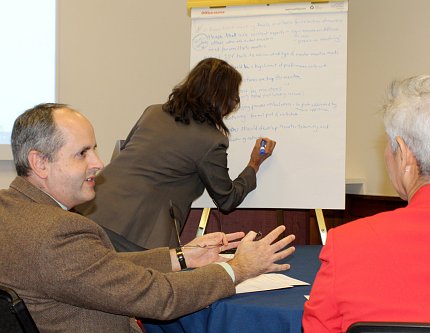Workshop Addresses Lack of Diversity in Workforce

Photo: Rebecca Newton
In collaboration with the Association of American Medical Colleges, leaders of the National Institute on Minority Health and Health Disparities gathered on campus recently to address barriers contributing to the lack of diversity in the biomedical workforce. This second phase of a 3-phase approach brought together officials from NIH, academia and leading medical associations.
Dr. Ross McKinney Jr., chief scientific officer at AAMC, presented provocative data outlining ways to tackle the issue at hand. Also present were NHLBI director Dr. Gary Gibbons and NIGMS director Dr. Jon Lorsch.
During the first phase, AAMC hosted representatives from participating medical associations at their D.C. headquarters to outline needs and define goals for the initiative. Focus groups noted lack of mentorship and funds to support programs and insufficient resources for innovation as key challenges.
The charge for the day was to develop novel approaches, action items and partnering methods. While NIMHD’s Scientific Advancement Plan recognizes the institute’s commitment to enhancing the diversity of the biomedical workforce by supporting and promoting training of minority health and health disparities researchers, leaders at the workshop urged a collective effort to help move the needle.

Photo: Rebecca Newton
According to the National Science Foundation, Hispanic scientists accounted for only 8.5 percent of health-related occupations in 2015; blacks accounted for only 6.4 percent of this workforce. NIMHD director Dr. Eliseo Pérez-Stable recognizes the benefit of a diverse research workforce. He presented recent estimates from the U.S. Census Bureau indicating that racial and ethnic minority populations in the United States will grow to become half of the population by 2060. “If our workforce is so discordant with the population, then we have a problem,” he said.

Photo: Rebecca Newton
Making room for the diverse perspectives and cultural sensitivities of the nation’s minority racial/ethnic scientists is crucial to improving the health needs of a growing minority population. All doctoral-level scientists—whether laboratory scientists, computation scientists, data scientists, epidemiologists or social scientists—have the opportunity to enrich their science by working on projects within heterogeneous teams. Those that lack diversity miss out on the opportunity to gain a variety of insights from those of varied backgrounds and experiences.
Working with scientists who represent underserved/health disparity populations is not only a good practice but also necessary to sustain public trust and increase minority participation in clinical trials. During breakout sessions, a suggestion was made to engage larger institutions to work with smaller regional institutions to recruit, mentor and develop diverse talent and train staff with a focus on diversity—a component of NIH’s Scientific Workforce Diversity Toolkit. Another idea was to provide mentoring within historically black colleges and universities and science, technology, engineering and mathematics high schools located in areas serving underrepresented students.
The third and final phase of the 3-phase approach will place an emphasis on forming an innovative process to produce deliverables and establishing realistic target dates for their completion.
